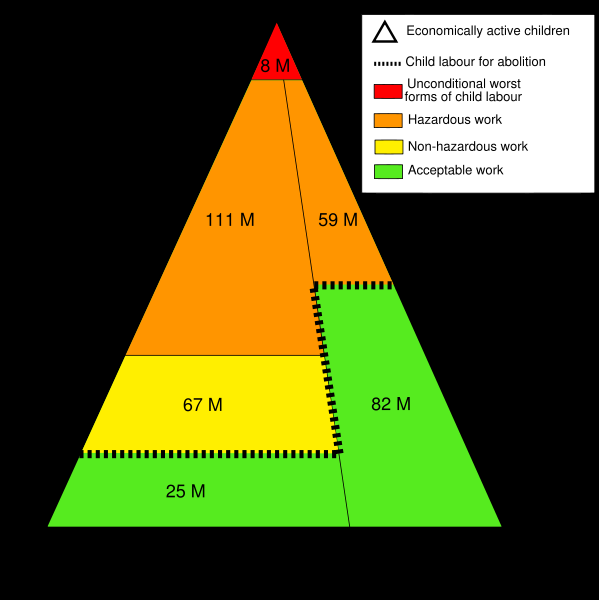I am a student of K.V.HEBBAL. I would like to deal with a hot topic in the
world which is often forgot: child labour. This blog is not supposed to
be a source of information but a place of exchange. I want you to react
by giving your ideas and your personal experience.
Monday, 16 April 2012
Saturday, 14 April 2012
Child Labour Laws
Child labour is a reality in spite of all the steps taken by the legal machinery to eliminate it. It prevails and persists as a world phenomenon in spite of child labour laws.
The causes of child labour in the contemporary world are the same as those in U.S. hundred years ago- namely poverty, lack of education and exposure, poor access to education, suppression of workers rights, partial prohibition of child labour and inadequate enforcement of child labour laws.
The existing law and codes of conduct regarding child labour are blatantly violated by the beneficiaries and the victims of this terrible practice all over the developing world. There are ambiguities in the export and manufacturing sector, which means multiple layers of outsourcing and production- making the monitoring of labour performers not only difficult but impossible. Extensive subcontracting also makes it impossible to identify the use of child labour whether intentional or unintentional.
Even when laws or codes of conduct exist, they are often violated.
The Indian constitution categorically states that child labour is a wrong practice, and standards should be set by law to eliminate it. The child labour act of 1986 implemented by the government of India makes child labour illegal in many regions and sets the minimum age of employment at fourteen years.
There are many loop holes in this law in terms of affectivity. First is that it does not make child labour completely illegal and does not meet the guidelines set by ILO concerning the minimum age for employment, which is fifteen years. Moreover the policies which are set to reduce incidences of child labour are difficult to implement and enforce. The government and other agencies responsible for the enforcement of these laws are not doing their job. Without proper enforcement all policies and laws concerning child labour prove useless.
Moreover certain sectors like agriculture and domestic work are not included in the exemption of child labour In some countries very strict child labour laws exist but the offices and departments responsible for implementing them are under funded and under staffed. The judicial machinery and courts are also found to be faltering and faulting where proper enforcement of such laws is concerned. Many state governments are feisty in allocating resources to enforce child labour laws.
There are also many loop holes while setting laws and rules for child labour which allows exploitation. For example in Nepal, the minimum age for a person to go for work is 14 years, but plantation of brick Cline's is exempted from this.
Kenya prohibits children under 16 from going to work in industries but excludes agriculture. Bangladesh also specifies a minimum age to go to work, but excludes agriculture and domestic work.
Indeed laws become unpractical and redundant in the face of necessity. Poor children and their family members depend so much on little ones to provide the basic necessities of life in the impoverished areas that it becomes impossible for them to adhere to any laws and regulations regarding child labour. We must also remember, that about one fifth of the world’s six billion humans live in absolute poverty.
Monday, 26 March 2012
Sunday, 25 March 2012
What is Child Labour
Child labour is done by any working child who is under the age specified by law. The word, “work” means full time commercial work to sustain self or add to the family income. Child labour is a hazard to a Child’s mental, physical, social, educational, emotional and spiritual development. Broadly any child who is employed in activities to feed self and family is being subjected to “child labor’.
It is obligatory for all countries to set a minimum age for employment according to the rules of ILO written in Convention 138(C.138). The stipulated age for employment should not be below the age for finishing compulsory schooling, that is not below the age of 15. Developing countries are allowed to set the minimum age at 14 years in accordance with their socio- economic circumstances.
C-138 has also made provisions for flexibility for certain countries, setting the minimum age of 12 and 13 for their children - but only for partaking in light work. Light work can be defined as children’s participation in only those economic activities which do not damage their health and development or interfere with their education. Yes, work that does not obstruct with a child’s education is considered light work and allowed from age 12 under the International Labour Organisation (ILO Convention 138). It is because of this that many children employed in part time work like learning craft or other skills of a hereditary nature are not called child labours. The same work translates into child lab or if a child is thrown into weaving carpets, working into factories or some other employment to earn money to sustain self, or augment his family’s income - without being given school education and allowed opportunities for normal social interactions. A child working part time (3-4 hours) to learn and earn for self and parents after school, is not considered ‘child labor’.
Subscribe to:
Posts (Atom)
